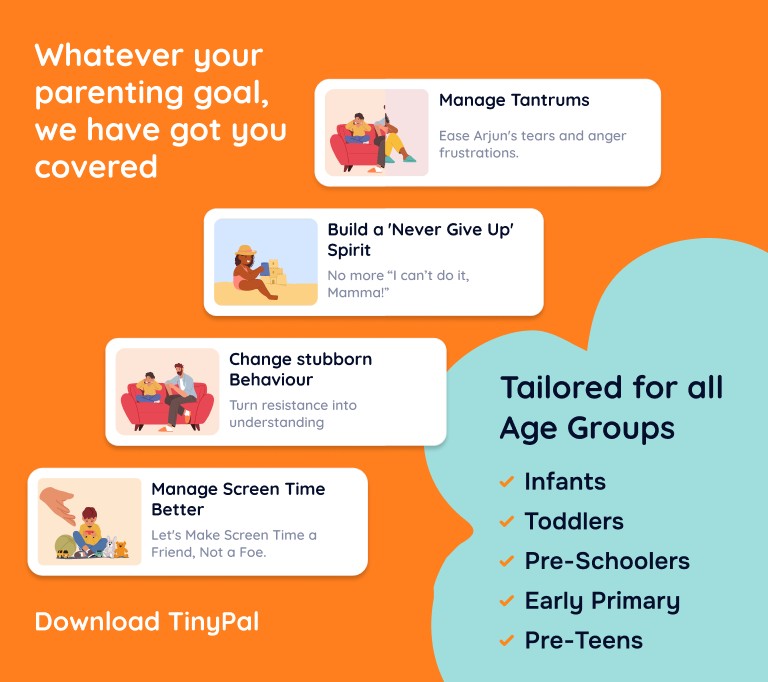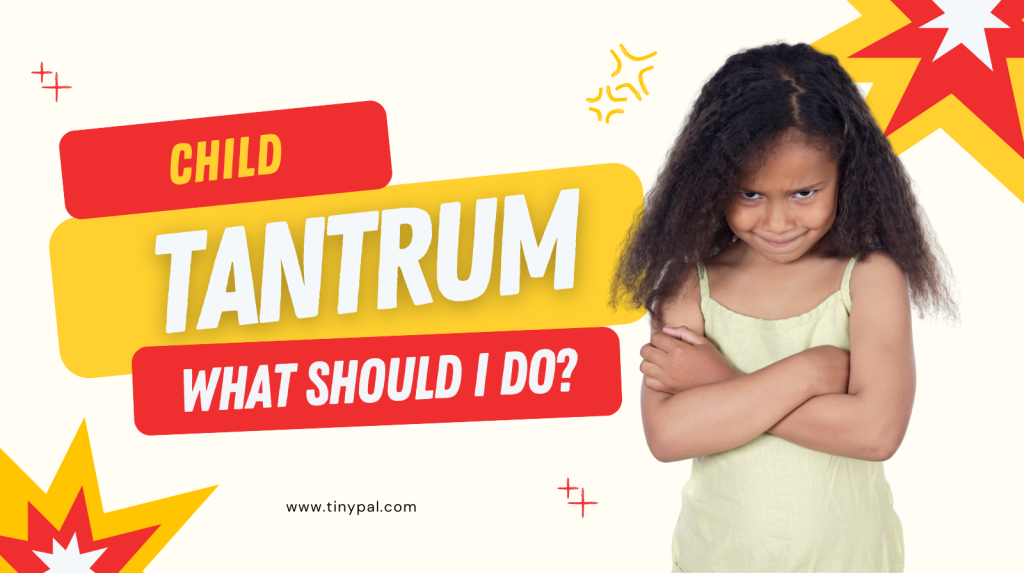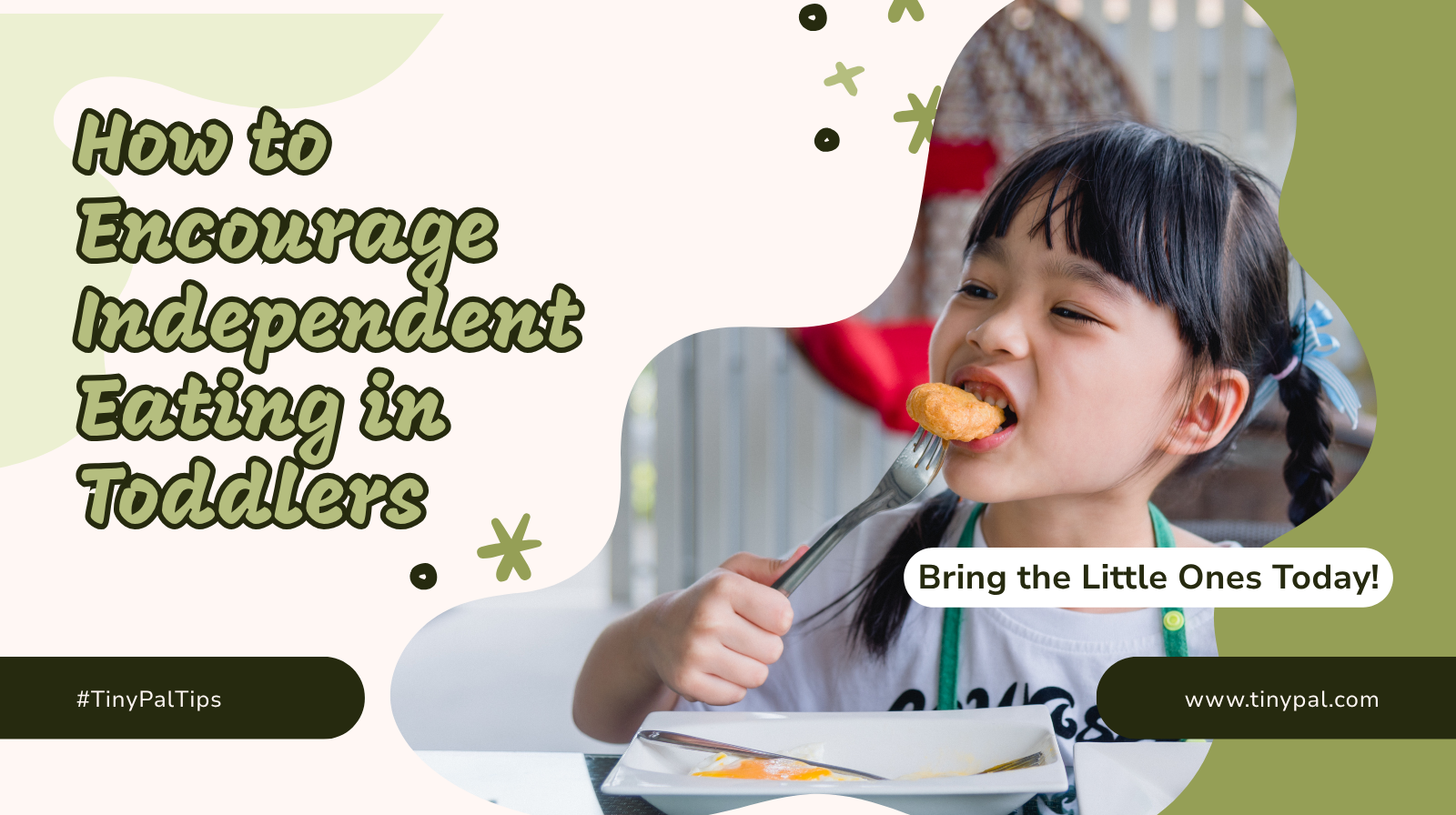How to Encourage Independent Eating in Toddlers: 12 Proven Parenting Tips That Build Confidence and Healthy Habits
It’s dinnertime.
You’ve prepared your toddler’s favorite meal — soft rice, some vegetables, and a splash of curd.
But as soon as you offer the spoon, your little one turns away, saying “No, Mama!” while trying to grab the spoon themselves.
You sigh. The mess, the food everywhere, the stress.
But what if this very moment — the messy, chaotic, food-flinging one — was the start of something beautiful?
That’s the beginning of independent eating — one of the biggest milestones in a child’s emotional development.
And as every parent soon learns, independence at the dining table is not just about food.
It’s about trust, confidence, coordination, and emotional growth — the same core principles that TinyPal, your AI-powered parenting companion, helps you build in your child every day.

Table of Contents
1. Understand Why Independent Eating Matters
Independent eating is more than a convenience. It’s a foundation for:
- Self-reliance: Your toddler learns “I can do it myself.”
- Fine motor development: Handling spoons, cups, and food strengthens coordination.
- Confidence & autonomy: Each bite builds trust in their abilities.
- Healthy food relationships: Kids who control eating develop better habits and less anxiety around food.
According to child psychologists, allowing toddlers to explore food freely helps prevent picky eating later — because they feel ownership over what goes into their mouth.
TinyPal’s parenting insights guide parents to know when to encourage independence and how to do it without creating stress or mess anxiety.
2. Start Early, But Follow Their Cues
Every child develops at a unique pace.
Some show interest in self-feeding as early as 10–12 months, while others take longer.
TinyPal’s AI-driven parenting guidance helps you recognize signs of readiness, like:
- Reaching for food or utensils
- Showing interest in others eating
- Trying to hold a spoon or cup
Encouragement at the right time builds confidence. Pushing too soon can create frustration or aversion.
“TinyPal taught me to follow my child’s curiosity, not the calendar.” — Elena, Italy
3. Make Mealtime a Safe Exploration Zone
Yes, it will get messy. That’s okay.
Encouraging independent eating means accepting spills as part of growth.
TinyPal calls this the “Learn Mess Method” — a stage where sensory exploration improves hand-eye coordination and tactile learning.
Tips:
- Use silicone mats and bibs for easy cleanup
- Offer finger-friendly foods (soft fruits, boiled veggies)
- Sit together so your toddler mimics your behavior
The more relaxed the environment, the more confident your child feels.
4. Use the 3E Rule: Encourage, Empower, Engage
TinyPal’s parenting experts created the 3E Rule to help parents make mealtimes stress-free:
- Encourage: Use positive language — “You’re doing great!” instead of “Don’t spill.”
- Empower: Let your child choose between two spoons or bowls.
- Engage: Talk about the food — “What color is this?” “How does it taste?”
These micro-conversations turn eating into learning, fostering both language and emotional growth.
5. Model the Behavior You Want to See
Children learn best through imitation — a psychological principle known as mirror learning.
Sit together and eat the same foods when possible. Show joy, curiosity, and patience.
Your toddler will begin to mimic your hand movements and expressions.
TinyPal’s daily parenting guidance encourages co-eating routines — short, intentional mealtimes that strengthen connection and emotional safety.

6. Offer Choices (Within Boundaries)
Toddlers crave control. When parents dictate every bite, resistance builds.
Instead, give controlled choices:
- “Would you like apple slices or banana today?”
- “Do you want to eat with your spoon or your hands?”
This method satisfies their need for autonomy without compromising nutrition — a key SXO (Search Experience Optimization) behavior pattern for emotional empowerment.
TinyPal even provides AI-personalized conversation starters for parents to make mealtime communication easier and more positive.
7. Create a Calm Mealtime Environment
Distractions like TV or mobile phones overstimulate toddlers and reduce awareness of hunger cues.
Create a calm environment:
- Sit at a small table together
- Turn off screens
- Use calm tones and soft lighting
The more peaceful the surroundings, the easier it is for toddlers to focus on eating.
TinyPal encourages sensory mindfulness — helping parents build rituals that reduce chaos and enhance focus.
8. Never Force-Feed
Force-feeding breaks trust. It teaches children to disconnect from their hunger cues, leading to overeating or anxiety later.
Instead of saying “Eat one more bite,” try:
“It’s okay if you’re full. We can eat again when you’re hungry.”
This simple shift builds a lifetime of healthy eating behavior.
TinyPal helps you recognize emotional hunger vs. physical hunger, so you guide your child with empathy instead of pressure.
9. Introduce Finger Foods First
Self-feeding becomes easier when toddlers can control their grip.
Offer safe, easy-to-hold foods like:
- Soft fruits (banana, mango)
- Steamed vegetables
- Mini pancakes or scrambled eggs
- Rice balls or pasta
These allow tactile exploration and immediate feedback.
TinyPal’s feeding guide helps you track developmental readiness and food safety for each stage — ensuring confidence and security during this transition.
10. Celebrate Progress, Not Perfection
Your toddler might eat three bites one day and throw food the next — that’s normal.
Celebrate effort, not outcomes.
Say: “You held the spoon by yourself today!” rather than “Why didn’t you finish it?”
These micro-celebrations reinforce positive associations with independence.
TinyPal reminds parents through gentle prompts and AI-driven insights to celebrate effort-based growth instead of focusing on volume or neatness.
11. Respect Appetite Fluctuations
Toddlers’ appetites change daily. Growth spurts, teething, and sleep patterns all affect hunger.
Instead of measuring success by how much they eat, observe consistency over time.
TinyPal’s emotional guidance modules teach parents to trust patterns — not panic over one skipped meal.
It’s about building long-term trust in your child’s self-regulation.

12. Make Mealtimes Emotional, Not Transactional
Food is not just fuel — it’s an emotional experience.
When parents replace pressure with connection, children associate eating with comfort, not conflict.
Share stories at the table. Talk about flavors. Laugh about the mess.
These moments shape emotional security — the foundation of a healthy relationship with food and family.
TinyPal calls this approach “Emotionally Intelligent Feeding” — helping parents build calm, connected, and conscious eating experiences daily.
The TinyPal Difference: Guidance That Grows with Your Child
TinyPal isn’t a tracker or schedule app.
It’s a parenting mentor, powered by AI, psychology, and empathy.
It learns from your parenting patterns and gives personalized suggestions that evolve as your child grows — whether it’s managing tantrums, building confidence, or encouraging self-feeding.
“TinyPal taught me to see every meal as a lesson in love, not discipline.” — Megan, USA
If you’re ready to raise confident, emotionally balanced children —
👉 Download the TinyPal Parenting App today and let empathy guide your parenting journey.
Testimonials
“My toddler refused to eat without help. TinyPal’s gentle guidance changed everything — now she insists on feeding herself!”
— Priya, India
“I stopped stressing about mealtime thanks to TinyPal. It helped me understand what my child’s behavior really meant.”
— Aisha, UAE
“TinyPal feels like having a calm parenting coach in my pocket.”
— Oliver, UK


1 thought on “How to Encourage Independent Eating in Toddlers”
Comments are closed.